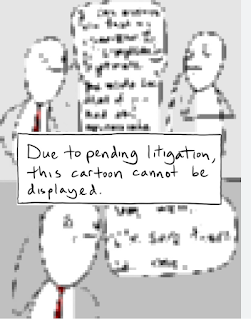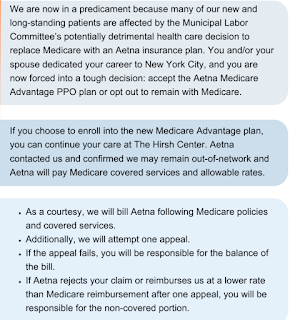Jeff, a former lawyer, lays out a path to victory.
A Betrayal of Public Trust: Why New York's Retirees Will Ultimately Prevail
The New York Court of Appeals' decision in Bentkowski v. City of New York represents
a troubling abdication of judicial responsibility that prioritizes
municipal budget constraints over the fundamental promise of good faith
that binds employer to employee.
While the Court's narrow focus on the technicalities of "clear and
unambiguous promises" may have temporarily shielded the City from
accountability on promissory estoppel grounds, the decision leaves
intact multiple powerful causes of action that virtually
guarantee the retirees will ultimately prevail when the case returns to
the trial court.
The Court of Appeals committed a fundamental error by applying an
artificially restrictive interpretation of what constitutes a "clear and
unambiguous promise." The Court dismissed decades of consistent
representations in Summary Program Descriptions (SPDs)
as merely "descriptive and for informational purposes only," ignoring
the basic principle that contractual obligations can arise from a course
of conduct and reasonable reliance, not just from formal written
agreements.
The Court's parsing of verb tenses—focusing on present tense language
like "becomes eligible," "is provided," and "supplements"—represents a
triumph of form over substance that would make even the most pedantic
grammarian blush. When the City tells employees
year after year that Medicare "provides" first-level benefits and the
City's program "provides" second-level benefits to "fill certain gaps in
Medicare coverage," any reasonable person would understand this as a
commitment to continue that structure.
Most egregiously, the Court dismissed the phrase "and thereafter" as
referring only to Medicare eligibility timing, not future benefits. This
interpretation is not just wrong—it's absurd. The plain language
clearly indicates that City benefits would continue
"thereafter" once Medicare eligibility begins. To read it otherwise
requires willful blindness to the obvious meaning.
Despite the Court's rejection of the promissory estoppel claim, the
remand to the trial court preserves numerous causes of action that
provide clear pathways to victory. Each represents a distinct legal
theory capable of delivering complete relief to the retirees.
The Second Cause of Action under the Retiree Health Insurance Moratorium
Act provides a compelling path to victory. This statute explicitly
prohibits reducing teacher retiree benefits unless active employees face
corresponding reductions. The facts demonstrate
a clear violation: the City's contributions dropped from $191.57 per
month to $15-22.50 per month for retirees while active employees
retained their plan choices and superior coverage. The law was
specifically designed to protect retirees who lack collective
bargaining power, making this differential treatment precisely what the
legislature sought to prevent.
The Ninth Cause of Action under the NYC Administrative Procedure Act
(CAPA) addresses the City's deliberate circumvention of required
rulemaking procedures. The healthcare policy change constitutes
rulemaking that affects a quarter-million retirees and creates
binding standards of general applicability. The City's failure to
provide public notice and comment procedures violated the procedural
rights of every affected retiree and represents a fundamental breach of
administrative law that courts cannot overlook.
The Sixth and Seventh Causes of Action under both NYC and New York State
Human Rights Laws present powerful discrimination claims. The policy
creates a disparate impact on disabled retirees under 65 who are
Medicare-eligible due to disability. While non-disabled
under-65 retirees keep their existing coverage options, disabled
retirees are forced into inferior Medicare Advantage plans. This
class-based discrimination against people with disabilities—those most
needing healthcare access—violates fundamental civil rights
protections and cannot be justified by mere cost savings.
Life-Threatening Consequences Demand Judicial Intervention
The Third Cause of Action challenging the dangerous disruption of
life-saving treatment presents compelling grounds for immediate relief.
Retirees with cancer and other serious conditions face the impossible
choice between continuity of care and financial ruin.
Many cannot obtain supplemental coverage due to pre-existing
conditions, while others face underwriting barriers that make coverage
unaffordable. The policy's arbitrary implementation, without
consideration of individual medical circumstances, fails even the
most basic rational basis review given its life-threatening impact on
vulnerable populations.
The Fourth Cause of Action addresses the City's failure to provide
adequate information for such a momentous decision. Major healthcare
decisions require accurate, complete information as a matter of
procedural due process. The City made material misrepresentations,
falsely assuring retirees their doctors would accept the new plan. Many
retirees never received comprehensive information packages, while the
deliberately complex opt-out process proved especially burdensome for
elderly participants. Given the irreversible
nature of this one-time decision with permanent consequences, the lack
of full disclosure constitutes a fundamental due process violation.
The Eighth Cause of Action for unjust enrichment recognizes that
healthcare benefits represent earned deferred compensation, not
gratuitous benefits. Mayor Adams himself called this policy a "bait and
switch" before taking office, acknowledging its unconscionable
nature. The City will reap hundreds of millions in annual savings while
benefiting from federal Medicare Advantage subsidies, all while
shifting costs to vulnerable retirees after decades of faithful service.
Good conscience demands restitution of these ill-gotten
savings.
The Eleventh Cause of Action under the Donnelly Act addresses the City's
creation of an unlawful monopoly through its exclusive Aetna contract.
The City bypassed competitive bidding processes, eliminating competition
among insurers and depriving retirees of
choice and competitive pricing benefits. Ironically, Aetna previously
made similar antitrust arguments against another City plan,
demonstrating the anticompetitive nature of such arrangements.
The Tenth Cause of Action recognizes the City's special relationship
with its retirees and the fiduciary duty to provide accurate healthcare
information. The City's material misstatements about provider acceptance
and plan benefits, combined with false assurances
about the opt-out process, created reasonable reliance that continues
to cause harm. The City knew retirees would rely on these statements for
enrollment decisions, making the negligent provision of false
information particularly egregious.
Beyond the legal technicalities lies a fundamental question of fairness
and public policy. The City of New York recruited employees for decades
with the explicit promise of comprehensive health benefits in
retirement. These employees—teachers, firefighters,
police officers, and countless other public servants—accepted lower
wages than they could have earned in the private sector based on the
understanding that their retirement security was guaranteed.
Many of these retirees are now in their 70s and 80s, having planned
their retirement finances around the expectation of Medicare
supplemental coverage. Some have relocated to states where they cannot
obtain supplemental coverage due to pre-existing conditions.
Others lack the financial resources to purchase private coverage. The
City's decision to abandon these vulnerable retirees represents a
breathtaking betrayal of the social compact that binds government to its
workers.
The Court of Appeals' decision should be understood as a temporary
setback rather than a definitive defeat. While the Court's analysis of
promissory estoppel was problematic, it leaves intact multiple
independent causes of action, each capable of providing
complete relief. The trial court's previous sympathy for the retirees'
position, combined with the opportunity for more complete factual
development, creates a favorable environment for ultimate success.
The remaining causes of action span constitutional law, statutory
violations, civil rights protections, antitrust law, and fundamental due
process rights. The City cannot simultaneously violate the state
constitution, ignore statutory protections, discriminate
against disabled individuals, endanger lives, deny due process, engage
in antitrust violations, and commit unjust enrichment while expecting
judicial protection.
Perhaps most importantly, the moral force of the retirees' position
remains undiminished. They kept their part of the bargain, serving the
City faithfully for decades in exchange for promised retirement
security. The City's attempt to renege on that promise
while hiding behind legal technicalities represents exactly the kind of
conduct that courts exist to remedy.
When this case returns to the trial court, it will do so with a powerful
arsenal of legal theories that survived appellate review. The
constitutional claims alone provide sufficient grounds for complete
victory, while the statutory violations, civil rights
protections, and due process claims offer multiple alternative paths to
the same destination.
The trial court proceedings will allow for complete factual development,
revealing the full scope of the City's representations and the
devastating impact on vulnerable retirees. This expanded record will
only strengthen the retirees' position and highlight
the unconscionable nature of the City's conduct.
Justice delayed is not justice denied. When this case concludes—as it
inevitably will—with vindication for New York's retired public servants,
the Court of Appeals' decision will be remembered as a regrettable
detour rather than a final destination. The multiple
causes of action that remain provide not just hope, but virtual
certainty that these retirees will ultimately prevail.
The City of New York made a promise. The remaining legal theories ensure it will be forced to keep it.













